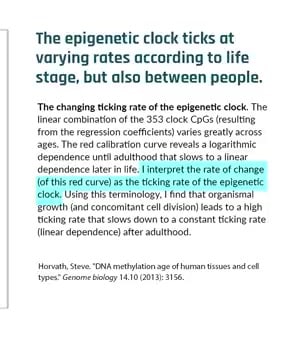Biological Age
Sources:
Rhonda Patrick has discussed biological age extensively. Here are some key insights:
- Biological age varies among individuals with the same chronological age due to genetics and lifestyle factors, which can influence the immune response to vaccines 1.
- Epigenetic clocks provide a better estimate of biological aging compared to chronological age because they can quantify changes in DNA methylation patterns that correlate with age-related diseases and mortality 2.
- Different biomarkers are used to assess biological age, including clinical markers and DNA methylation. A study found that people age at different rates based on numerous biomarkers like glycated hemoglobin, VO2 max, and triglycerides 3.
- Epigenetic clocks are especially useful in measuring molecular and cellular aging, which may predict functional declines before they are clinically observable, especially in younger individuals 4.
- The Horvath clock was one of the first to accurately measure biological age through DNA methylation, reflecting the concept of "epigenetic age acceleration" when someone's DNA appears older than their chronological age 5.
- Peter Diamandis discussed with Rhonda Patrick the limitations of human biology for longevity and how we might overcome them with evolving technologies, potentially adding decades or centuries to life 6.
- DNA methylation, one of the epigenetic processes, alters gene expression as we age and is a key factor in the changes observed in biological aging 7.
These discussions indicate the complexity and importance of understanding biological age, as it has significant implications for health span, disease risk, and intervention strategies aimed at promoting longevity.
RELATED QUESTIONS






